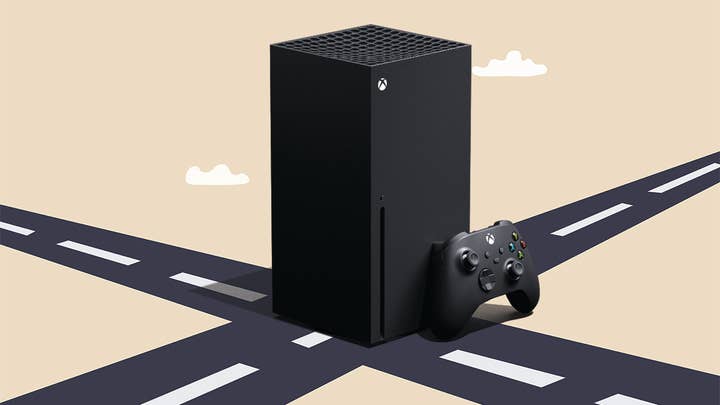Xbox at the crossroads | Opinion
Microsoft’s new ABK deal would set the company on a very specific path – can it also focus on the first-party pipeline Starfield is meant to exemplify?
Sign up for the GI Daily here to get the biggest news straight to your inbox
This week sees us at a philosophical crossroads for Microsoft’s Xbox division and its gaming ambitions more generally.
On one hand, the hotly anticipated Starfield – arguably the first truly notable fruit of the acquisition of ZeniMax two years ago, and Bethesda’s first major new IP in nearly three decades – is almost upon us, with hype for the game peaking as pre-loading becomes available ahead of the launch. It’s the most important software launch for the Xbox Series X/S consoles to date – there’s more on the line here than even with the launch of Halo Infinite, I’d argue – and Microsoft is hopeful that this will mark a turning point for a platform’s well-documented struggles with its first-party software pipeline.
On the other hand, the saga of Microsoft’s attempted acquisition of Activision Blizzard rolls onwards, with one of the most significant developments in months being Microsoft’s return to negotiations with the UK’s Competition and Markets Authority and a new formulation of the deal, under which the rights to cloud streaming for all of Activision’s games would be handed over to Ubisoft.
The billions of dollars spent on acquisitions thus far haven’t delivered the pipeline anyone hoped for
This is meant to address the concerns that were core to the CMA’s blocking of the deal, which were focused on the potential distortion of the emerging streaming market – as the CMA and pretty much everyone else involved has been at pains to point out, there’s really no justification for blocking the deal on the grounds of the status of the existing console market, where PlayStation has an enormous lead over the Xbox platforms (as does Switch, if you choose to consider Nintendo an actual competitor in this market).
The timing of these two events is coincidental of course, but it does throw into sharp relief what two very different potential futures for Xbox look like. If the newly restructured ABK deal is one possible future, then Starfield is representative of a different possible future, one where the Xbox division finds ways to compete with Sony without spending $70 billion on buying a major publisher.
To listen to the heated rhetoric around the deal now, you might imagine that the latter is a near-impossibility; Microsoft has been at pains to emphasise the enormous head-start Sony has in building out its studio system and software pipeline, leading many people to believe that any effort to catch up “organically”, as it were, would be an impossible, Sisyphean task.
Yet it’s worth remembering that until 18 months ago, that was Plan A as far as the world was concerned; there wasn’t even an inkling that Microsoft, having already spent over $10 billion on buying Zenimax and a brace of well-regarded studios, was gearing up to spend almost an order of magnitude more on buying one of the industry’s biggest publishers. The plan, as the world knew and accepted it, was for Xbox to build up its first-party publishing through founding new studios and making judicious acquisitions of studios and smaller publishers, and there was a distinct lack of Cassandras yelling about the impossibility of that rather reasonable objective.
The chances are that the modified deal will go through. The CMA, I suspect, will still be antsy about the implications of Activision games being “subscription-exclusive” to Game Pass, but that’s not a market that’s quite as obviously distinct from the console market as the burgeoning cloud streaming market is, and if that’s the only remaining sticking point it won’t be sufficient to resist the pressure to approve the deal. That’s the path Xbox appears to be on; one of the big questions that remains open is to what extent following down the path of the Activision acquisition will erase or overshadow the organic, incremental growth of Xbox’ first-party publishing that we’d all assumed and hoped for up until the ABK deal was announced at the start of 2022.
I’ve argued before that I think Xbox – if not Microsoft overall – would be better served without buying ABK. I’m something of a pessimist about giant mergers in general, having seen the enormous amount of focus they consume and the destruction of value that almost inevitably results; the merged entities are never quite the full sum of their parts.
The Activision Blizzard acquisition is unlikely to be an exception, and will see the Xbox division exerting enormous amounts of time and effort to integrate a gigantic and rather troubled publisher into its structure, with all the attendant disruption that will bring. There will be power struggles over the identity and control of the entity that emerges at the end of that process; there are people at Activision who are very, very conscious that their company is larger, in many significant ways, than the business unit into which it will be integrated, and who feel strongly if quietly about how much power they and their business units (which, they would argue, are a much more successful publishing operation than Microsoft’s own) should wield as that integration rolls forward.

ABK will add a large number of new titles to Microsoft’s publishing pipeline, of course, which is a very welcome influx given how dry that pipeline has been in recent years. It’s valid, though, to ask how much focus Microsoft will be able to maintain on “the other path” as this monstrously huge acquisition rolls onwards.
That process of incubating new first-party studios, integrating its existing acquisitions like Bethesda, and buying skilled developers it has a strong working relationship with – the Sony model, in essence, though with some clear Microsoft tweaks to the strategy – is itself a very major commitment of corporate resources. Microsoft’s advantage in executing that model in the past four years or so was that it was backed by deeper pockets than Sony’s, and a heightened urgency – both of which are arguably things that will no longer be the case once the ABK deal goes through.
In an ideal world, Starfield really would be the starting gun for Xbox’ software turnaround – an exemplar of a strong and growing pipeline of major first-party games that are Xbox (& PC) exclusives, with lots of new IP and new studios in the mix to further strengthen the brand identity of Xbox. That’s the future we hoped for before the ABK deal was ever even mentioned in public, and of course, it doesn’t have to disappear just because the ABK deal goes through.
There will be costs, not all of them predictable, to making platform competition into a game decided by fat wallets
On the other hand, we can’t ignore the elephant in the room, which is that with the best will in the world, that bright future isn’t exactly what’s happening.
You can’t blame the ABK deal (at least not entirely) for the fact that Starfield feels more like an isolated solo tentpole than the beginning of a first-party deluge. The games are coming, and some of them look pretty great, but it’s a trickle, not a flood; I don’t begrudge any studio the time it needs to make good quality games (especially when they’re doing it without working their employees half to death in the process), but at the point in the Xbox’ lifespan when it really needs major titles, the billions of dollars spent on studio and publisher acquisitions thus far haven’t delivered the pipeline anyone hoped for.
Perhaps Activision Blizzard plugs that gap (and the less acknowledged on mobile platforms, where Microsoft and Xbox are largely a non-presence outside of Minecraft). The streaming issue has been something of a sideshow – the CMA’s concerns about that nascent market notwithstanding, the Activision deal’s primary purpose is much more concrete and current, and that’s to make Microsoft into a bigger player in game publishing (exclusive or otherwise) as quickly as possible. Microsoft can afford to ditch streaming rights – at least while streaming is not yet commercially relevant – in pursuit of that goal, especially since its revised acqusition proposal still retains the real prize, namely the ability to put Activision titles onto Game Pass.
The possible future that we originally saw for Xbox – the excitement about Microsoft’s renewed commitment to building up its studios to the point where it could be a genuine rival to Sony’s software slate – hangs in the balance. The alternative, in which almost a hundred billion dollars in total is spent to buy enough publishers to make Microsoft a major player, is probably the reality we’re getting.
The extent to which that will hamper further development of Microsoft’s own game studios and first-party publishing remains to be seen, but it’s highly unlikely that the effect will be zero; no company, not even Microsoft, has unlimited bandwidth to keep every plate spinning all at once. Ultimately, the acquisition may well be the less commercially risky move, despite its enormous price tag; it does leapfrog Microsoft to a prime position in the publishing world, after all.
Spare a thought for the road we won’t travel, though – because there will be costs, not all of them easily predictable, to making platform competition into a game entirely decided by deep pockets and fat wallets.
Sign up for the GI Daily here to get the biggest news straight to your inbox

